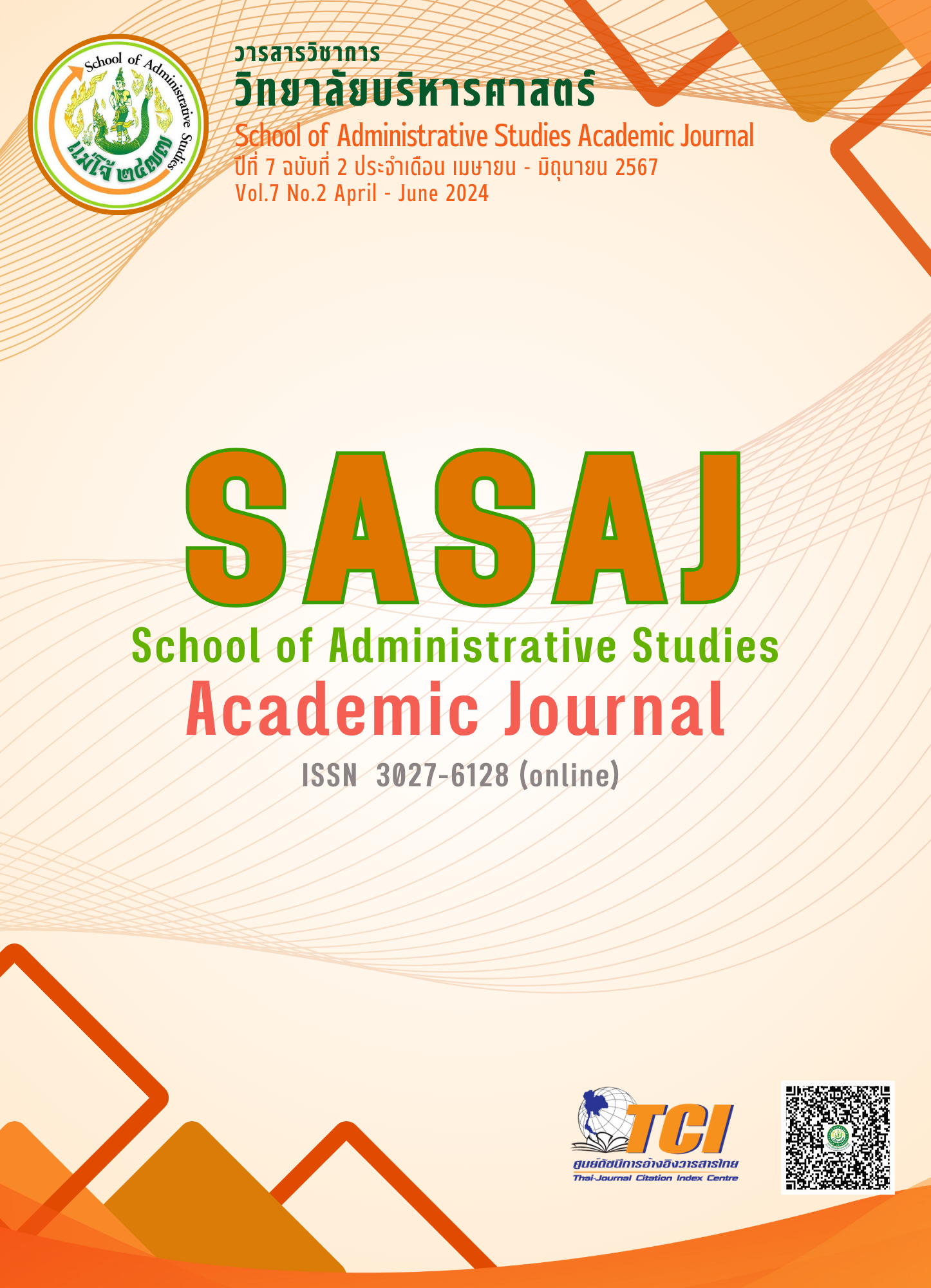รูปแบบนวัตกรรมธุรกิจเพื่อสังคมสู่ความยั่งยืน ในเขตภาคเหนือตอนบนของประเทศไทย
Main Article Content
บทคัดย่อ
เกษตรกรรุ่นใหม่ Young Smart Farmer (YSF) ในปัจจุบันมีความมุ่งมั่นในการเป็นผู้ประกอบการเพื่อสังคมเพื่อนำกำไรที่เกิดขึ้นไปสร้างความเข้มแข็งให้กับสังคม โดยมีเป้าหมายหลักเพื่อทำให้สังคมดีขึ้น การวิจัยครั้งนี้มีวัตถุประสงค์เพื่อ 1) ศึกษาความตั้งใจของเกษตรกร รุ่นใหม่ในการเป็นผู้ประกอบการเพื่อสังคม 2) ศึกษารูปแบบนวัตกรรมธุรกิจเพื่อสังคมของเกษตรกรรุ่นใหม่ที่ดำเนินกิจการเพื่อสังคมใน 8 จังหวัดภาคเหนือตอนบน งานวิจัยนี้เป็นงานวิจัยเชิงคุณภาพโดยใช้แบบสัมภาษณ์แบบกึ่งโครงสร้าง จากผู้ให้ข้อมูลสำคัญ (Key Informants) คือ เกษตรกรรุ่นใหม่ผู้มีประสบการณ์ในการเป็นผู้ประกอบการเพื่อสังคม เป็นเวลา 5 ปี โดยใช้วิธีการเลือกกลุ่มตัวอย่างเป็นเฉพาะเจาะจง (Purposive Sampling) จำนวน 8 คน ใช้วิธีการวิเคราะห์ข้อมูลด้วยการวิเคราะห์เนื้อหาและนำเสนอเชิงพรรณนาความ
ผลการศึกษาพบว่า ความตั้งใจของผู้ประกอบการเพื่อสังคมเกิดจากความตั้งใจในการแก้ไขปัญหาสังคมควบคู่ไปกับการดำเนินธุรกิจ ซึ่งมีการวางรูปแบบนวัตกรรมธุรกิจเพื่อสังคมโดยการนำเอาการแก้ปัญหาสังคมมาเป็นเป้าหมายในการดำเนินธุรกิจ นอกจากนี้ผู้ประกอบการเพื่อสังคมยังนำเทคโนโลยีต่างๆ เข้ามาใช้ในการดำเนินงาน มีการสร้างเครือข่ายเพื่อแลกเปลี่ยนองค์ความรู้และนวัตกรรมใหม่ๆ เพื่อสร้างคุณค่าทางเศรษฐกิจและสังคมควบคู่กันจนเกิดการพัฒนาสู่การสร้างรูปแบบนวัตกรรมธุรกิจเพื่อสังคมที่ยั่งยืน
Article Details

อนุญาตภายใต้เงื่อนไข Creative Commons Attribution-NonCommercial-NoDerivatives 4.0 International License.
ลิขสิทธิ์
เอกสารอ้างอิง
กานต์ปพิมพ์ อรรถเจตน์. (2565). แนวทางลดความเหลื่อมล้ำทางรายได้ของครัวเรือนเกษตรไทยหลังวิกฤติโควิด-19. วารสารทหารพัฒนา, 46(1), 47-58.
กรีนพีซ. (2565). ฝุ่นควันภาคเหนือ : ปัญหาเชิงโครงสร้างเบื้องหลังวาทกรรมคนเผาคือคนผิด.
กรมส่งเสริมการเกษตร. (2559). Young Smart Farmer อนาคตและทิศทางภาคเกษตรไทย. สืบค้นจาก https://esc.doae.go.th/wp-content/uploads/2018/10/young-smart-farmer.pdf
ชัญญพัชร บุนนาค. (2559). แนวความคิดการสร้างธุรกิจกิจการเพื่อสังคม (Social Enterprise) ในประเทศไทย (รายงานวิจัย). กรุงเทพฯ: มหาวิทยาลัยมหิดล.
ชาย โพธิสิตา. (2562). ศาสตร์และศิลป์การวิจัยเชิงคุณภาพ: คู่มือนักศึกษาและนักวิจัยสังคมศาสตร์ (พิมพ์ครั้งที่ 8). กรุงเทพฯ : อมรินทร์พริ้นติ้งแอนด์พับลิชชิ่ง.
ธนาคารโลก. (2564). เจาะลึกความเหลื่อมล้ำไทย แก้ได้ไหม แก้อย่างไร. สืบค้นจาก https://www.worldbank.org/th/country/thailand/overview
บุษกร ปังประเสริฐ, อารีย์ นัยพินิจ, และ ภัทรวดี เพิ่มวณิชกุล์. (2563). การดำเนินธุรกิจอย่างยั่งยืนของผู้ประกอบการวิสาหกิจเพื่อสังคมในประเทศไทย: วิธีการวิจัยแบบผสม. BU Academic Review, 19(2), 73-87.
มารยาท โยทองยศ, และ ทรงวาด สุขเมืองมา (2559). ปัจจัยที่มีอิทธิพลต่อความตั้งใจที่จะเป็นผู้ประกอบการของนักศึกษาปริญญาตรี: กรณีศึกษามหาวิทยาลัยกรุงเทพ. สุทธิปริทัศน์, 30(95), 103-115.
ศศิชา อินทวิเชียร. (2564). ความตั้งใจที่จะเป็นผู้ประกอบการภาคการเกษตร ของเจเนอเรชั่น Z ในประเทศไทย (สารนิพนธ์). มหาวิทยาลัยมหิดล, กรุงเทพฯ.
สถาบันวิจัยเพื่อการพัฒนาประเทศไทย. (2565). การตั้งหลักใหม่ภาคเกษตรไทยในอนาคต. สืบค้นจาก https://tdri.or.th/2023/02/strategy-for-agricultural-growth/
สำนักงานคณะกรรมการพัฒนาการเศรษฐกิจและสังคมแห่งชาติ. (2561). ข้อเท็จจริงเรื่องสถานการณ์ความเหลื่อมล้ำของประเทศไทย. สืบค้นจาก http://nscr.nesdc.go.th/test_nesdb
สำนักงานพัฒนาการวิจัยเกษตร. (2562). การปลูกผักปลอดภัย. สืบค้นจาก http://blog.arda.or.th/ผักสวนครัว/การปลูกผักปลอดภัย/
ไสว วีระพันธ์, และ ธีรภัทร์ ถิ่นแสนดี. (2564). ความปกติใหม่ทางการศึกษากับความเหลื่อมล้ำที่มากยิ่งขึ้น. วารสารวิชาการรัตนบุศย์, 3(2), 69-83.
สุภาภร ภิญโญฉัตรจินดา. (2561). การวิเคราะห์การเป็นผู้ประกอบการทางสังคมของผู้ประกอบการในเขตประกอบ การสวนอุตสาหกรรมโรจนะ จังหวัดอยุธยา. วารสารVeridian E-Journal ฉบับภาษาไทย สาขามนุษยศาสตร์ สังคมศาสตร์ และศิลปะ, 11(1), 662–678.
Ajzen, I. (1991). The theory of planned behavior. Organizational Behavior and Human Decision Processes, 50(2), 179–211.
Battilana, J., & Dorado, S. (2010). Building sustainable hybrid organizations: The case of commercial microfinance organizations. Academy of Management Journal, 53(6), 1419-1440.
Creswell, J. W. (2014). Research Design: Qualitative, Quantitative and Mixed Methods Approaches (4th ed.). Thousand Oaks: SAGE Publication, Inc.
Czinkota, R. M., Kudiger, R. H., Basile, G., & Ferri, A. M. (2018). For-Benefit Company (fBComp): An innovative social-business model. The Italian case. Journal of Business Research, 119, 377 - 387
Davies, I. A., & Doherty, B. (2018). Balancing a hybrid business model: The search for equilibrium at Cafédirect. Journal of Business Ethics, 157, 1043-1066.
Doherty, B., Haugh, H., & Lyon, F. (2014). Social Enterprise as Hybrid Organizations: A Review and research Agenda. International Journal of Management Reviews, 16(4), 417-436.
Evans, S., Vladimirova, D., Holgado, M., Fossen, V. K., Yang, M., Silva, A. E., &
Barlow, Y. C. (2017). Business Model Innovation for Sustainability: Towards a Unified Perspective for Creation of Sustainable Business Models. Business Strategy and the Environment. 26(5), 597–608.
Foss, N. J., & Saebi, T. (2017). Fifteen years of research on business model Innovation: How far have we come, and where should we go? Journal of Management, 43(1), 200-227.
Gupta, P., Chauhan, S., Paul, J., and Jaiswal, M. P. (2020). Social entrepreneurship research: A review and future research agenda. Journal of Business Research, 113, 209-229.
Hakami, S. (2021). he Role of Social Entrepreneurship in Community Development. A Case Study of Social Entrepreneurship in Saudi Arabia. Psychology and Education Journal, 58(2), 154-161.
Hockerts, K. (2017). Determinants of Social Entrepreneurial Intentions. Entrepreneurship Theory and Practice, 2017(1), 105-130.
Bygrave, W., & Minniti, M. (2000). The Social Dynamics of Entrepreneurship. Entrepreneurship Theory and Practice, 24(3), 25-36.
Pache, A.-C., & Santos, F. (2012) Inside the Hybrid Organization: Selective Coupling as a Response to Competing Institutional Logics. Academy of Management Journal, 56(4), 972–1001.
Pansuwong, W., Photchanachan, S., & Thechatakerng, P. (2022). Social innovation: relationships with social and human capitals, entrepreneurial competencies and growth of social enterprises in a developing country context. Social Enterprise Journal © Emerald Publishing Limited, 19(1), 1750-8614. DOI 10.1108/SEJ-02-2022-0014
Soumitra, D., Lanvin, B., Wunsch-Vincent, S., Rivera, L. L., & World Intellectual Property Organization (2021). Global innovation index. Geneva: World Intellectual Property Organization. Retrieved from https://www.wipo.int/edocs/pubdocs/en/wipo_pub_gii_2021.pdf
Sukphan, J., & Kitdamrongtam, P. (2022). Information Communication Technologies in Thailand: The Influence of Social Structure and the Autonomy of Use. ASIAN REVIEW, 35(2), 78-94.
Sukphan, J., Satjasomboon, S. (2023). Challenges of Young Female Social Entrepreneurs in Post-Covid 19: A Case Study of Mueang Pon, Mae Hong Son, Thailand. Rajabhat Chiang Mai Research Journal, 24(3), 65-79.
Talbot, D., Raineri, N., & Daou, A. (2020). Implementation of sustainability management tools: The contribution of awareness, external pressures, and stakeholder consultation. Corporate Social Responsibility and Environmental Management, 28(1), 71–81.


